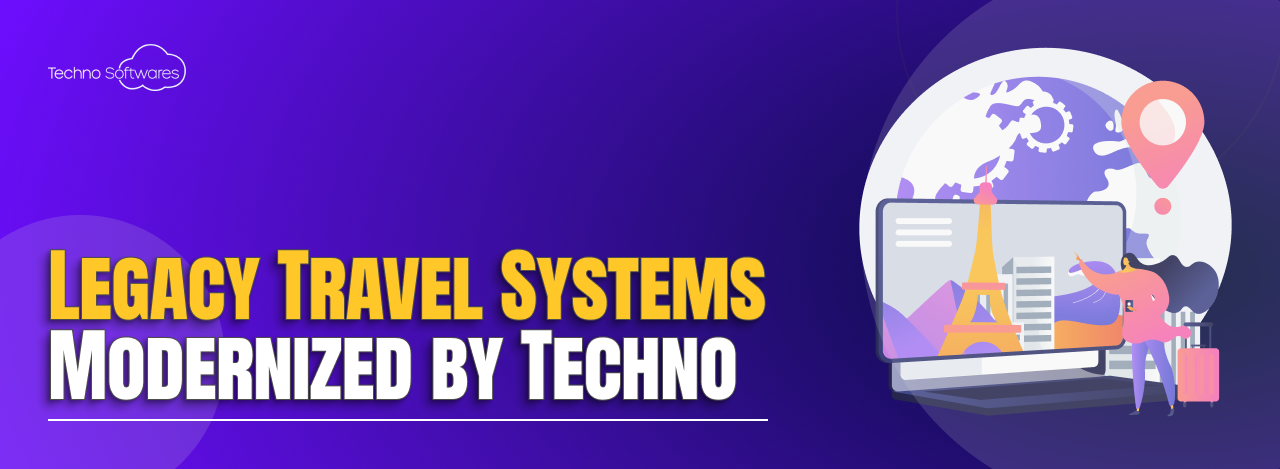Modernizing Travel Booking Systems with Legacy Migration by Techno Softwares
In the rapidly evolving landscape of the travel industry, legacy migration has emerged as a critical process for organizations seeking to remain competitive and relevant. As we navigate through an era defined by technological advancements, the need to transition from outdated systems to modern, agile platforms becomes increasingly apparent. Legacy systems, often characterized by their age and inflexibility, can hinder our ability to respond to market demands and customer expectations.
This migration is not merely a technical upgrade; it represents a strategic shift that can redefine how we operate and engage with our clients. As we delve into the intricacies of legacy migration, it is essential to understand the underlying motivations driving this transition. The travel booking systems that once served us well may now be limiting our potential for growth and innovation.
By embracing modern technologies, we can enhance our operational efficiency, improve customer experiences, and ultimately drive profitability. The journey of legacy migration is complex, but it is one that we must undertake to ensure our long-term success in a competitive marketplace.
Key Takeaways
- Legacy migration in travel booking systems is essential for keeping up with modern technology and meeting customer demands.
- Modernizing travel booking systems can lead to improved efficiency, cost savings, and enhanced customer experience.
- Challenges and risks of legacy migration include data security concerns, system downtime, and potential disruptions to business operations.
- Techno Softwares play a crucial role in legacy migration by providing expertise in system integration, data migration, and software development.
- Case studies of successful legacy migration in travel booking systems highlight the benefits of improved performance, scalability, and flexibility.
The Benefits of Modernizing Travel Booking Systems
Modernizing our travel booking systems offers a plethora of benefits that can significantly enhance our operational capabilities. One of the most compelling advantages is the ability to streamline processes and reduce manual interventions. By automating various aspects of booking management, we can minimize errors and improve the speed at which we serve our customers.
This efficiency not only leads to cost savings but also allows us to allocate resources more effectively, focusing on strategic initiatives rather than mundane tasks. Moreover, modern systems provide us with access to real-time data analytics, enabling us to make informed decisions based on current market trends and customer preferences. With advanced reporting tools at our disposal, we can gain insights into booking patterns, customer behavior, and operational performance.
This data-driven approach empowers us to tailor our offerings to meet the evolving needs of travelers, ultimately enhancing customer satisfaction and loyalty. In an industry where personalization is key, leveraging modern technology can set us apart from competitors who are still reliant on outdated systems.
Challenges and Risks of Legacy Migration in Travel Booking Systems
While the benefits of legacy migration are clear, we must also acknowledge the challenges and risks associated with this transition. One of the primary concerns is the potential disruption to our existing operations during the migration process. As we shift from legacy systems to modern platforms, there may be temporary setbacks that could impact our service delivery.
It is crucial for us to develop a comprehensive migration strategy that minimizes downtime and ensures a seamless transition for our customers. Additionally, the complexity of integrating new technologies with existing infrastructure poses another significant challenge. We may encounter compatibility issues that require careful planning and execution.
Furthermore, there is the risk of data loss or corruption during the migration process, which could have serious implications for our business operations. To mitigate these risks, we must invest in thorough testing and validation procedures before fully implementing new systems.
The Role of Techno Softwares in Legacy Migration
Techno Softwares play a pivotal role in facilitating successful legacy migration in travel booking systems. These specialized software solutions are designed to streamline the migration process, ensuring that we can transition smoothly from outdated platforms to modern technologies. By leveraging Techno Softwares, we can automate many aspects of the migration process, reducing the manual effort required and minimizing the risk of errors.
Moreover, Techno Softwares often come equipped with advanced features that enhance our new systems’ functionality. From user-friendly interfaces to robust data management capabilities, these tools empower us to optimize our operations post-migration. Additionally, many Techno Softwares offer ongoing support and updates, ensuring that we remain at the forefront of technological advancements in the travel industry.
By partnering with reliable software providers, we can navigate the complexities of legacy migration with confidence.
Case Studies of Successful Legacy Migration in Travel Booking Systems
Examining case studies of successful legacy migration can provide valuable insights into best practices and strategies that have proven effective in the travel industry. One notable example is a major airline that undertook a comprehensive migration from its outdated booking system to a cloud-based platform. This transition not only improved operational efficiency but also enhanced customer engagement through personalized offerings and real-time updates.
By leveraging data analytics, the airline was able to tailor its marketing efforts and significantly increase customer satisfaction. Another compelling case involves a travel agency that faced challenges with its legacy system’s scalability. As demand for online bookings surged, the agency recognized the need for modernization.
By migrating to a flexible booking platform, they were able to accommodate increased traffic while providing a seamless user experience. The agency reported a substantial increase in bookings and revenue following the migration, demonstrating the tangible benefits of embracing modern technology.
Best Practices for Legacy Migration in Travel Booking Systems
To ensure a successful legacy migration, we must adhere to best practices that guide us through this complex process. First and foremost, conducting a thorough assessment of our current systems is essential. This evaluation should encompass not only technical aspects but also user experiences and operational workflows.
By identifying pain points and areas for improvement, we can develop a targeted migration strategy that addresses our specific needs. Additionally, involving key stakeholders throughout the migration process is crucial for fostering buy-in and ensuring alignment with organizational goals. Regular communication and collaboration among teams can help us navigate challenges more effectively and maintain momentum during the transition.
Furthermore, investing in training for our staff on new systems will facilitate smoother adoption and minimize resistance to change.
Future Trends in Travel Booking Systems Modernization
As we look ahead, several trends are shaping the future of travel booking systems modernization. One prominent trend is the increasing integration of artificial intelligence (AI) and machine learning technologies into booking platforms. These advancements enable us to offer personalized recommendations based on individual traveler preferences, enhancing the overall customer experience.
By harnessing AI-driven insights, we can anticipate customer needs and tailor our offerings accordingly. Another trend gaining traction is the rise of mobile-first solutions in travel booking systems. With more travelers relying on mobile devices for their bookings, it is imperative for us to prioritize mobile optimization in our modernization efforts.
This shift not only enhances accessibility but also aligns with changing consumer behaviors in an increasingly digital world.
The Importance of Legacy Migration for Travel Industry
In conclusion, legacy migration is not just a technical necessity; it is a strategic imperative for organizations within the travel industry. As we face mounting pressures from competitors and evolving customer expectations, modernizing our travel booking systems becomes essential for sustaining growth and relevance. The benefits of enhanced efficiency, improved customer experiences, and data-driven decision-making far outweigh the challenges associated with this transition.
By embracing best practices and leveraging innovative technologies such as Techno Softwares, we can navigate the complexities of legacy migration with confidence. As we look toward the future, staying attuned to emerging trends will further empower us to adapt and thrive in an ever-changing landscape. Ultimately, investing in legacy migration is an investment in our future success as leaders in the travel industry.
In the context of enhancing digital solutions for businesses, it’s crucial to consider not only the systems that interface with customers but also the backend processes that ensure the smooth operation of those systems. For instance, while the article on Modernizing Travel Booking Systems with Legacy Migration by Techno Softwares focuses on updating outdated travel booking systems, another related aspect is ensuring the software’s reliability and performance through rigorous testing. The importance of a solid software testing strategy is highlighted in a related article, Importance of Software Testing Strategy for Online Businesses. This piece discusses how strategic testing can prevent issues in software deployment, enhancing user satisfaction and business efficiency, which is essential when implementing new systems like those discussed in the travel booking modernization article.
FAQs
What is legacy migration in the context of travel booking systems?
Legacy migration in the context of travel booking systems refers to the process of upgrading or replacing outdated and inefficient legacy systems with modern, more advanced technology. This is done to improve the overall performance, functionality, and user experience of the travel booking system.
Why is modernizing travel booking systems important?
Modernizing travel booking systems is important because it allows travel companies to keep up with the latest technological advancements, improve efficiency, enhance user experience, and stay competitive in the market. It also helps in reducing maintenance costs and increasing system reliability.
What are the benefits of modernizing travel booking systems with legacy migration?
The benefits of modernizing travel booking systems with legacy migration include improved system performance, enhanced user experience, increased efficiency, reduced maintenance costs, better security, and the ability to integrate new features and functionalities.
How does legacy migration improve the overall performance of travel booking systems?
Legacy migration improves the overall performance of travel booking systems by replacing outdated technology with modern, more efficient systems. This can lead to faster processing times, improved reliability, and better scalability.
What are the challenges involved in modernizing travel booking systems with legacy migration?
Challenges involved in modernizing travel booking systems with legacy migration include data migration, system integration, ensuring minimal disruption to ongoing operations, and managing the transition to the new system without impacting the customer experience.





